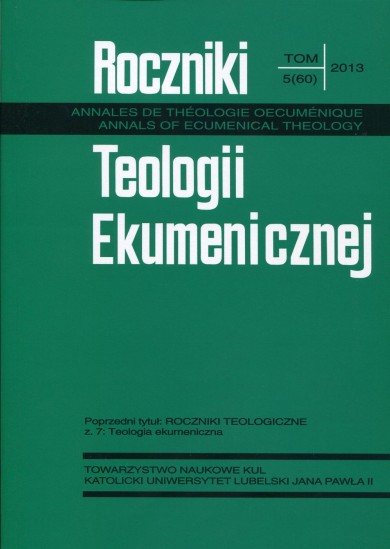W poszukiwaniu nowych dróg ku jedności chrześcijan
IN SEARCH OF NEW WAYS TOWARDS CHRISTIAN UNITY
Author(s): Krzysztof LeśniewskiSubject(s): Christian Theology and Religion
Published by: Katolicki Uniwersytet Lubelski Jana Pawła II - Wydział Teologii
Keywords: unity; Christians: crisis; Christianity; witness; Christ; Trinity; truth; AGREEMENT; dialogue; metanoia
Summary/Abstract: The first part of the article describes signs of a crisis of Christianity in the contemporary world. One can distinguished both the deepening of a crisis of faith and various threats, which have been very dangerous for Christians. Among many causes of the modern crisis of faith it should be pointed out the tolerance for pathologies, the triumph of atheistic philosophies, the anthropological reductionism, and the relativisation of personal evil. Apart from that in some countries in the world Christians have been persecuted and even put to death. It is necessary to take into account this general context if one would like to take into consideration the problem of the necessity of common witness on Christ and the cause of the lack of Christian Unity. Today, as the Author ascertain in the second part of his text, it is impossible to deal with ecumenical matters without relating them to various factors influencing on the situation of Christianity in the world. As it is evident, so far the full Eucharistic Fellowship has not been reached by the ecumenical dialogue. Practically, a greater part of agreements of theological dialogues have not got reception on the parish level. There is no common Christian language, which could be commonly used, what it points out to deep disagreement about the Truth. From the Orthodox point of view unity is to be understood not as a mere administrative arrangement and a human achievement, but as a manifestation of grace and as the fullness of the new life which renews the earth-born and the whole of their world. In order to understand why the Christian unity is so difficult to acquire it is necessary to look at the Church of Christ as a personal community in resemblance of the Holy Trinity as the community of the Divine Persons. The Author in the third part of the article underlines that the Trinitarian relations between God the Father, the Son of God and the Holy Spirit consist the most perfect pattern for relations between human persons in the fellowship of the Church. From such a point of view the Church is not an occasional ‘happening’, where the Word of God is preached and listened to and the sacraments are performed, but as the reality of sonship in the Spirit, that is, as a constant movement of filial grace from the Father, giving his Son to us in the Spirit, and as a return of this by us, ‘giving grace’ to him by offering back to him his Son in his incarnate, sacrificial and risen state as the head of a body comprising all of us and all that exists. The fourth part of the article refers to a question of the unity of the Church and understanding of truth.
Journal: Roczniki Teologii Ekumenicznej
- Issue Year: 2010
- Issue No: 2 (57)
- Page Range: 35-56
- Page Count: 22
- Language: Polish

